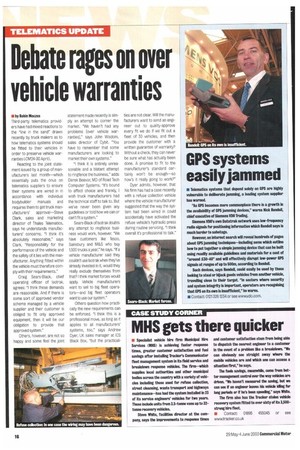Debate rages on over vehicle warranties
Page 16

If you've noticed an error in this article please click here to report it so we can fix it.
• by Robin Moues Third-party telematics providers have had mixed reactions to the line in the sand" drawn recently by truck makers as to how telematics systems should be fitted to their vehicles in order to preserve vehicle warranties (CM24-30 April).
Reacting to the joint statement issued by a group of manufacturers last month—which essentially puts the onus on telematics suppliers to ensure their systems are wired in in accordance with individual bodybuilder manuals and requires them to get truck man ufacturers' approval—Steve Clark, sales and marketing director of Thales Te!emetics, says he understands manufacturers concerns. "I think it's absolutely reasonable," says Clark. "Responsibility for the performance of the vehicle and the safety of It lies with the manufacturer. Anything fitted within the vehicle must therefore comply with their requirements."
Craig Sears-Black, chief operating officer of lsotrak, agrees: "I think these demands are reasonable. And if there is some sort of approved vendor scheme managed by a vehicle supplier and their customer is obliged to fit only approved equipment, then it will be our obligation to provide that approved system."
Others, however, are not so happy and some feel the joint statement made recently is simply an attempt to corner the market. 'We haven't had any problems (over vehicle warranties]," says John Wisdom, sales director of Cybit. "You have to remember that some manufacturers are looking to market their own systems."
"I think it is entirely unreasonable and a blatant attempt to ringfence the business," adds Derek Beevor, MD of Road Tech Computer Systems. "It's bound to affect choice and frankly, I wish truck manufacturers had the technical staff to talk to. But we've never been given any guidelines or told how we can or can't fit a system."
Sears-Black of lsotrak doubts any attempt to ringfence business would work, however. 'We have customers like Tesco, Sainsbury and M&S who buy 1,500 trucks a year," he says. la vehicle manufacturer said they couldn't use Isotrak when they've already invested in it, would they really exclude themselves from that? I think market forces would apply. Vehicle manufacturers want to sell to big fleet operators—and big fleet operators want to use our system."
Others question how practically the new requirements can be enforced. "I think this is a professional move, as long as it applies to all manufacturers' systems, too," says Andrew Dyer, UK sales manager at ICS Black Box, "but the practicafi
ties are not clear. Will the manufacturers want to send an engineer out to quality-approve every fit we do if we fit out a fleet of 30 vehicles, and then provide the customer with a written guarantee of warranty? Without a check, they can never be sure what has actually been done. A promise to fit to the manufacturer's standard certainly won't be enough—so how's it really going to work?"
Dyer admits, however, that his firm has had a case recently with a refuse collection vehicle where the vehicle manufacturer suggested that the way the system had been wired in could accidentally have activated the refuse vehicle's hydraulic press during routine servicing. "I think overall it's professional to talk."
























































































































































